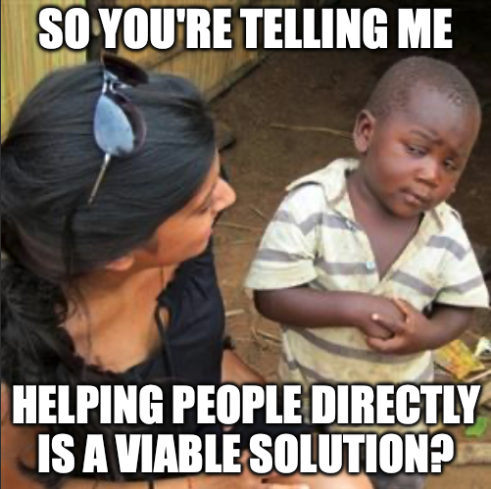Denver’s basic income pilot — which first started payments in fall 2022 — focused on over 800 Coloradans experiencing homelessness, including people living in cars, temporary shelters, the outdoors, or other non-fixed living situations. Participants like Laws were given direct cash payments, no strings attached, and could spend the money on whatever they needed.
Denver released the project’s one-year report on June 18, showing that 45% of participants secured their own house or apartment after receiving basic income for 10 months. They also experienced fewer emergency room visits, nights spent in a hospital or a temporary shelter, and jail stays. The report estimates that this reduction in public service use saved the city $589,214.

I just can’t believe that when you give money to people who don’t have enough they will spend it on basic necessities! Maybe we should try replicating this nationally to see if this was just an outlier.
For a control, maybe do an income for everyone. To keep is simple, we would need to stick to the basics and just give everyone the same amount and see if it provides universal stability. There is probably some kind of name that would cover this universally basic income.
This can’t be right. I’m certain money is required to trickle from somewhere. You can’t just give it to people!
/s
Their motto should be “The cruelty is the point” for all the policies they push.
Isn’t it already named “The Dole”? 🤔
Or — now hear me out — we give all that money to corporations and watch it trickle down to these people. Probably in spades!
First of all, I know you’re being sarcastic and I’m agreeing with you, not trying to counteract your sarcasm.
What is so frustrating is, these are just made up numbers, invisible to everyone but the banks, being hoarded in tax havens. These multi billion (trillion?) dollar companies just stockpile it in Ireland or the Cayman Islands or wherever, they don’t put it back into the economy. You can bet your ass that these low income people put it right back into the economy. How could they even hoard it? Tax the corporations properly and go after the dodgers with all we have, it’s our only way out of this mess.
Edit: Apparently they did the same thing to Ireland: https://www.cnet.com/tech/tech-industry/apple-paradise-papers-reportedly-cash-jersey-channel-island-to-avoid-irish-taxes/
I’m more concerned about made up numbers in the original article on Denver’s pilot UBI. I want to game this out with help, the math doesn’t quite add up.
So, it cost about ($12,000 per person for one year) $480,000 in cash stipends to get those 400 (assuming roughly half of roughly 800 participants) people to reduce their use of public services. The report says that their reduced need for services saved their city $589,214. It saved the city $109,214.00 NET.
I think you made some assumptions here that you cannot. The saving for the city does not say if it is per month or year, so we cannot assume it is a monthly thing. We also cannot assume they stopped payments for anyone as there was no conditions attached.
It could be that this doesn’t pay for itself directly, but if people get careers, they pay more tax over their lifetimes and probably spend more that has a positive effect on the local economy.
I believe basic income is a positive thing and should be rolled out, but there is no guarantees it pays back to councils directly. They have an obligation to their citizens regardless and having that safety net is worth investing in.
To your good point about the city potentially recouping expenses through tax revenue, growing Denver’s tax base doesn’t appear to an objective of this program, as 55% of recipients did not appear to use the money to help themselves get legally eligible for jobs, i.e. you need a legal address to receive paper mail to get on a payroll in the US, because employers want it to put down on the paperwork for taxes. Employers want to please the IRS more than they want to hire you, unfortunately for a person without an address on record. It DOES NOT mean they didn’t get jobs. It just means that if they did, they are under the table jobs.
Good point and cheers for a thoughtful reply. :) The article states that two private foundations paid out about $10 million to finance the pilot program. The city of Denver seems to have no direct investment in this program, but it’s unclear from the article. It states that State university students did data gathering during the project and paid up to $30.00 for each response from stipend recipients. Given the above, I would respectfully suggest that these self-reports exchanged for money may be biased, confirmation bias could be a huge factor. The university is the only entity that has released their findings so far, which means that the only metric we have is the pilot project director’s opinion that, to paraphrase, “It went so well, we need more funding!”
Thank you for doing the math, it seemed hinky to me. I’m trusting you though, lol.
No problem, thank you for posting this, I’m fascinated by how this article is constructed.






